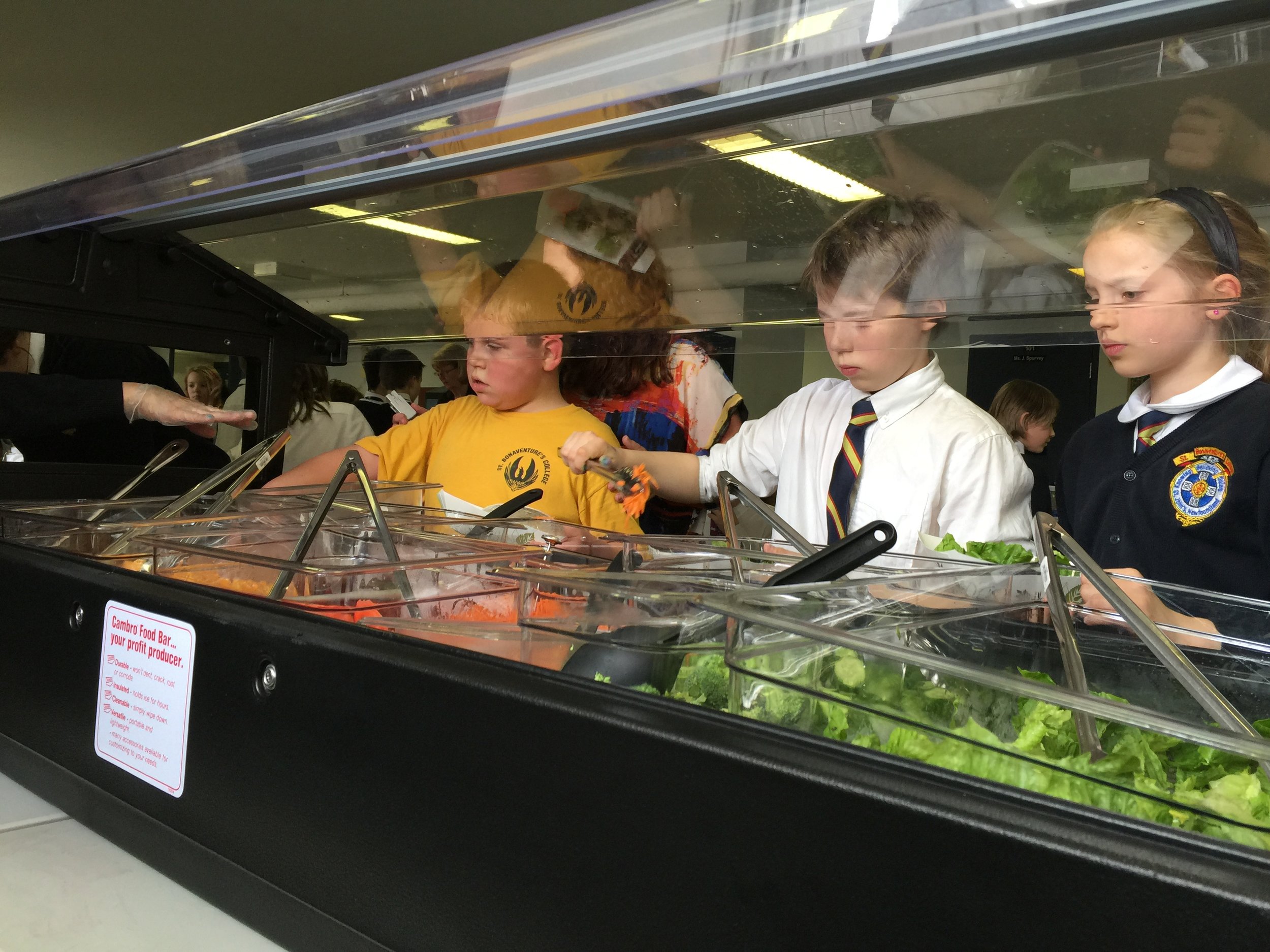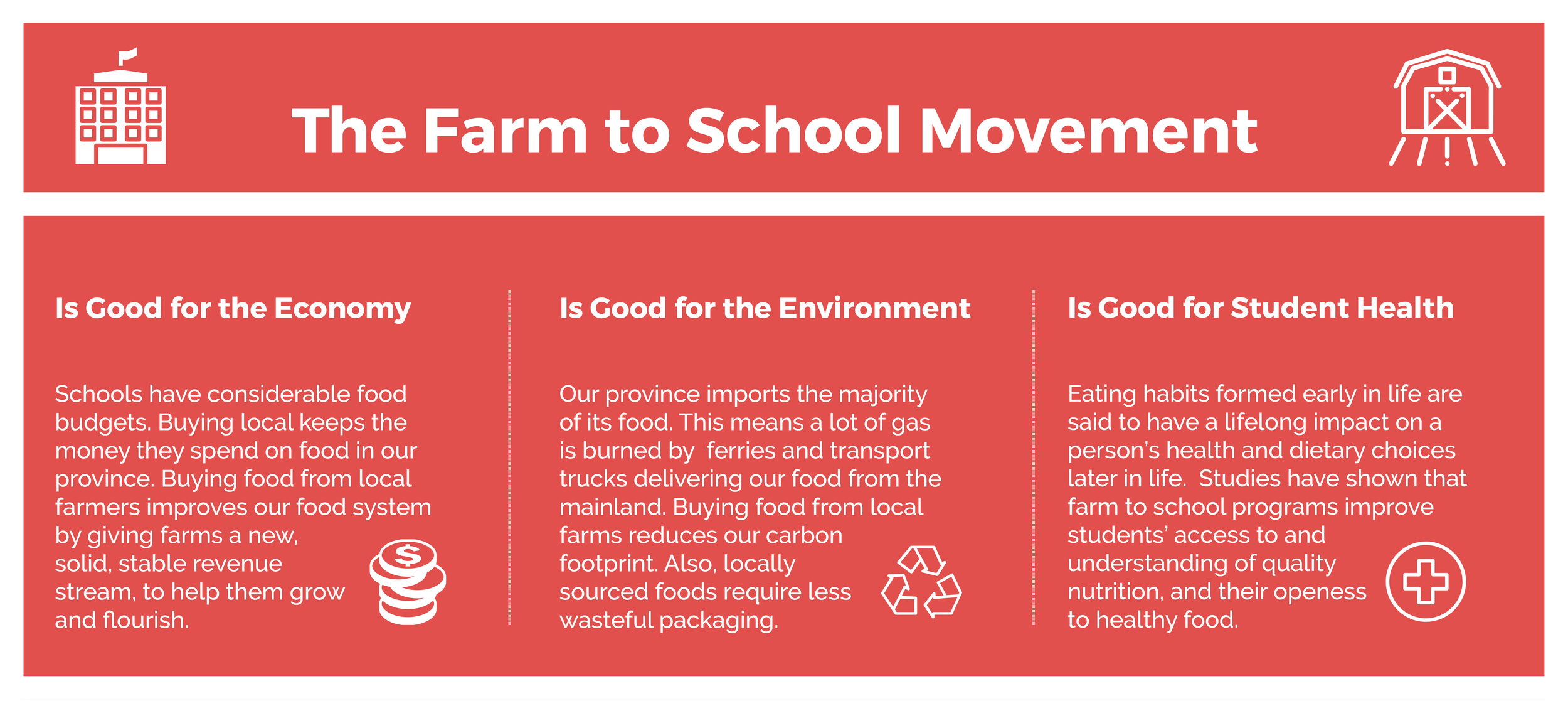Farm to School
Food First NL is the provincial lead for a nationwide farm-to-school movement led by Farm to Cafeteria Canada. We support schools that wish to apply for grants to establish new or expand food programs and food-based learning activities on their premises. The primary goal is to improve access to fresh food in the school environment, while also enhancing student food literacy, and sparking their interest in the food system.
Past School Partnerships
St. Bonaventure’s and Lester’s Farm & Market
St. John’s — When a group of students at St. Bonaventure’s College approached their teacher Chris Peters, asking for a wider variety of healthy options in the cafeteria, he got in touch with Sarah Ferber at Food First NL.
Food First NL, St. Bonaventures College, Lester’s Farm & Market, Chartwells Food Services, and Farm to Cafeteria Canada worked together to successfully implement the first Farm to School Salad Bar of its kind in Newfoundland. It launched in the spring of 2015. As much produce as possible comes from Lester’s Farm, and it changes with the season to ensure freshness, variety, and availability of healthy offerings.
Peters says one of the main ideas behind the program is to get kids thinking about food — where it comes from and how it’s grown.
It’s a long term goal of the school to improve food literacy among students, by connecting the program with the school curriculum. St. Bonaventures also hosts a composting program to divert organic waste, and a school garden and greenhouse that produces food for a local food bank.
Clarenville Middle School and
Three Mile Ridge Farm
St. Teresa’s School and
The Autism Society
Clarenville — Principal Paul Power says, “Our vision is to engage our entire school community in growing and harvesting food.” He says the school will incorporate the healthy food choices being served in the new salad bar into their health class curriculum.
Power wants the school to teach students food skills and knowledge they can carry and build upon well into their adult years. In addition to the new salad bar in their cafeteria, students will be exposed to, and directly take part in hands-on learning opportunities at a farm.
He says Clarenville Middle School is excited to promote the importance of healthy eating, and to “inclusively provide healthy lunch options for those who may otherwise not have access to these selections.”
St. John’s — St. Teresa’s will network with various local farmers in addition to its community partner, The Autism Society, which has a well-established social enterprise around gardening.
In addition to their farm to school salad bar, St. Teresa’s will work with Iron & Earth to establish a school garden with strong ties to the community. The aim is to “find opportunities for students to learn about, and to be engaged in local farming, local produce, and local products … and recognize the importance that food plays in overall wellbeing.” The school garden will be maintained by students, their families, and various community organizations. St. Teresa’s will aim to “develop food literacy among students, and ensure that fresh, local produce is available for their salad bar on a regular basis.”
Provincial School Food Gatherin (2015)
In 2016, Food First NL organized the first ever Provincial School Food Gathering. More than 20 key stakeholders from a variety of sectors came together to discuss and imagine the future of food in schools. Connections were made, ideas were shared, and everyone came away from the event with the confidence to help drive the farm to school movement forward.
Studies have shown that farm to school programs improve youth’s access to and understanding of quality nutrition, as well as their openess to trying new vegetables and fruits. Overall, the program improves the freshness, quality, and nutritional value of food in the school environment, while increasing youth’s tendency toward a diet rich in vegetables and fruit.
Being exposed to a farm-to-school operation in their daily lives also increases student interest in food systems, farming, nutrition, where their food comes from, and careers in the food industry.
Channeling the considerable food budgets of schools into the revenue streams of our local farmers and food producers gives them a new and stable source of income to help them to grow, hire more staff, and invest more money in the production of local food. This builds a more vibrant and self-sufficient food system in Newfoundland & Labrador, and keeps more money in our provincial economy.
This project has been made possible through our partnership with Farm to Cafeteria Canada.






